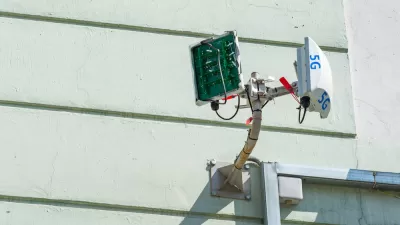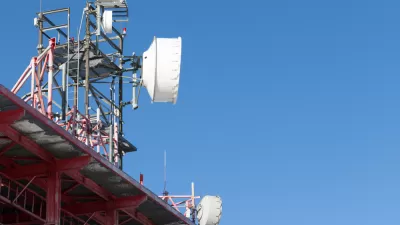Most deployment of 5G "small cells" won't get any resistance from federal regulations.

Jeremy Horwitz reports that the U.S. Federal Communications Commission has taken steps to ease the way for the implementation of 5G cellular networks.
In effect, the decision, approved by a 3-2 vote, will streamline the approvals process for small cells by exempting most planned deployments from review under both the National Environmental Policy Act (NEPA) and National Historic Preservation Act (NHPA). Small cells are advanced radio hardware essential to next generation cellular networks.
Horwitz explains the case made by companies rushing into the 5G market:
According to [FCC Commissioner Brendan] Carr, though only 0.33 percent of the federal reviews actually resulted in changes to planned deployments, they consumed tens of millions of dollars each year and caused significant deployment delays. Nearly 30 percent of the cost of deploying each small cell came from NEPA and NHPA reviews, which if eliminated would save “at least $1.56 billion” during the 5G rollout process.
Horwitz notes that the decision wasn't particularly controversial, but state and local officials, along with tribal governments, raised concerns about local control. Carr also "noted that the order doesn’t restrict localities’ rights to review and approve small cell deployments." The issue of local control over 5G infrastructure deployment is complicated by the placement of small cells on public poles and streetlights. The state of California already devoted a contentious legislative session to the matter, only to have Governor Jerry Brown veto a bill approved by the State Legislature.
FULL STORY: FCC votes to streamline 5G small cell approval process, paving way for 2018 rollouts

Planetizen Federal Action Tracker
A weekly monitor of how Trump’s orders and actions are impacting planners and planning in America.

Restaurant Patios Were a Pandemic Win — Why Were They so Hard to Keep?
Social distancing requirements and changes in travel patterns prompted cities to pilot new uses for street and sidewalk space. Then it got complicated.

Maui's Vacation Rental Debate Turns Ugly
Verbal attacks, misinformation campaigns and fistfights plague a high-stakes debate to convert thousands of vacation rentals into long-term housing.

In California Battle of Housing vs. Environment, Housing Just Won
A new state law significantly limits the power of CEQA, an environmental review law that served as a powerful tool for blocking new development.

Boulder Eliminates Parking Minimums Citywide
Officials estimate the cost of building a single underground parking space at up to $100,000.

Orange County, Florida Adopts Largest US “Sprawl Repair” Code
The ‘Orange Code’ seeks to rectify decades of sprawl-inducing, car-oriented development.
Urban Design for Planners 1: Software Tools
This six-course series explores essential urban design concepts using open source software and equips planners with the tools they need to participate fully in the urban design process.
Planning for Universal Design
Learn the tools for implementing Universal Design in planning regulations.
Heyer Gruel & Associates PA
JM Goldson LLC
Custer County Colorado
City of Camden Redevelopment Agency
City of Astoria
Transportation Research & Education Center (TREC) at Portland State University
Jefferson Parish Government
Camden Redevelopment Agency
City of Claremont





























